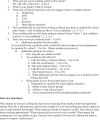Impact of Medical Scribe Experiences on Subsequent Medical Student Learning
- PMID: 34457958
- PMCID: PMC8368573
- DOI: 10.1007/s40670-021-01291-1
Impact of Medical Scribe Experiences on Subsequent Medical Student Learning
Abstract
Introduction: Many US pre-health professional students prepare for applying to medical training by transcribing clinician-patient encounters. Scant literature of the effects of scribing experiences before starting medical training exists. We conducted a study to investigate student perspectives about medical scribing's educational impact on clinical skill development.
Methods: Using a mixed-methods approach, medical and physician assistant students were surveyed and interviewed about clinical experiences and confidence before entering medical training, and the impact of scribing on clinical skills learning. Thematic analysis revealed salient themes in participants' perspectives on the scribing experience.
Results: A total of 214 (33%) of the 658 students completed the survey; 66 (31%) had scribing experience. Scribes were more confident (p ≤ 0.001) in clinical note writing and history taking than non-scribes. Thematic analysis revealed perceptions that scribing impacted clinical note writing, medical knowledge, communication, and healthcare environment functioning.
Discussion: Findings suggest that the scribing experience affects confidence and perceived skills, particularly clinical note writing. Future research could explore the impact on clinical skill development through comparative performance-based assessment.
Conclusion: Measuring the impact of scribing before entry to medical/physician assistant school on clinical skill development could provide directives for best approaches to clinical skills education in health professionals training.
Keywords: Clinical skills; Clinical teaching & learning; Communication skills; Medicine; Scribing.
© International Association of Medical Science Educators 2021.
Conflict of interest statement
Conflict of InterestThe authors declare no competing interests.
Similar articles
-
Self-efficacy and confidence of medical students with prior scribing experience: A mixed methods study.Med Educ Online. 2022 Dec;27(1):2033421. doi: 10.1080/10872981.2022.2033421. Med Educ Online. 2022. PMID: 35174763 Free PMC article.
-
The implementation of scribing within a medical school's pre-clinical curriculum: pilot study.BMC Med Educ. 2022 Apr 25;22(1):315. doi: 10.1186/s12909-022-03379-7. BMC Med Educ. 2022. PMID: 35468791 Free PMC article.
-
Medical and Undergraduate Student Perceptions on Scribing in an Emergency Department.Cureus. 2021 Mar 11;13(3):e13836. doi: 10.7759/cureus.13836. Cureus. 2021. PMID: 33859895 Free PMC article.
-
The Potential Impact of Scribes on Medical School Applicants and Medical Students with the New Clinical Documentation Guidelines.J Gen Intern Med. 2018 Nov;33(11):2002-2004. doi: 10.1007/s11606-018-4582-8. Epub 2018 Jul 31. J Gen Intern Med. 2018. PMID: 30066114 Free PMC article. Review.
-
Effectiveness of high fidelity simulation versus low fidelity simulation on practical/clinical skill development in pre-registration physiotherapy students: a systematic review.JBI Database System Rev Implement Rep. 2019 Jun;17(6):1229-1255. doi: 10.11124/JBISRIR-2017-003931. JBI Database System Rev Implement Rep. 2019. PMID: 30964770
Cited by
-
Using Appreciative Inquiry to Explore Effective Medical Interviews.Behav Sci (Basel). 2021 Aug 24;11(9):116. doi: 10.3390/bs11090116. Behav Sci (Basel). 2021. PMID: 34562954 Free PMC article.
-
The Experience of Medical Scribing: No Disparities Identified.Adv Med Educ Pract. 2024 Mar 5;15:153-160. doi: 10.2147/AMEP.S439826. eCollection 2024. Adv Med Educ Pract. 2024. PMID: 38476633 Free PMC article.
References
-
- Platt J, Altman W. Can medical scribes improve quality measure documentation? J Fam Pract. 2019;68(5):E1–e7. - PubMed
LinkOut - more resources
Full Text Sources

